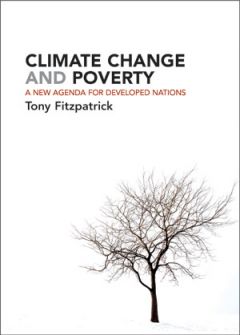Climate Change and Poverty: A new agenda for developed nations

The author incorporates the intrinsic value of nature and a concern for future generations and non-human beings into a socio-ecological understanding of poverty. Anthropogenic climate change – and environmental issues more broadly – encourages us to revisit the debate around the nature of poverty, its conceptualization, and the pathways towards transcending its drivers. A critique of the economic system and property regime that has caused and shaped poverty over the last two centuries – capitalism, particularly in its economic liberal version – underpins the main thesis of the book: “the ecologically excessive, careless and destructive use of key socionatural resources is closely connected to the social deprivations that characterise that usage for millions of those on low incomes”.
Structured around a conceptual and empirical discussion, the book seeks an ecosocial understanding of poverty, with particular reference to the UK. Chapters 1 to 4 constitute the more theoretical and conceptual parts of the discussion, while Chapters 6 to 10 are more empirical.
The author proposes a new conceptualization of poverty on the basis of an adapted version of the capabilities approach. This modified version, while recognizing the multifaceted nature of poverty, simultaneously conserves its material basis. The understanding of the environment or natural system as the meta-capability – which makes other capabilities possible – places attention on socionatural resources and the definition of poverty as a deprivation of multiple capabilities. Since those resources are relational entities evolving in space and time, poverty is also defined in terms of “ecospatial” and “ecotemporal” deprivations. All these complete the theoretical account on which ecosocial policies are assessed in the second part of the book.
Current policy debates in the UK around energy, food, land, air and water are introduced, mainly highlighting the competing imperatives around each socionatural resource. Examples are the dilemma between reducing and eventually eliminating fuel poverty, on the one hand, and decreasing carbon emissions, on the other hand (Chapter 6); the new dilemma in affluent societies of available cheap food versus affordable healthy food (Chapter 7); and the issue of reducing housing-related poverty and simultaneously containing urban sprawl (Chapter 8). Whether synergies rather than trade-offs can be advanced, the concept of “knotted complexities” presented in Chapter 10 brings to the fore the complex, intricate and interactive links that characterize natural–social relations. In doing so, the book warns us against misleading assumptions that pathologize consumers’ behaviours and decisions – e.g. low-income individuals being held responsible for socioeconomic circumstances they did not create and over which they have limited control.
The ecosocial approach does not suggest that there can ever be a once-and-for-all solution, since a green society has to be constantly remaking itself. Instead, a spirit of flexibility is required to make our way forward “in a fog of uncertainties, of risks we cannot assess and potential outcomes we cannot fully anticipate or discern”.
Book note prepared by María Evangelina Filippi
Search the Book notes database
Our Book notes database contains details and summaries of all the publications included in Book notes since 1993 - with details on how to obtain/download.
Use the search form above, or visit the Book notes landing page for more options and latest content.
For a searchable database for papers in Environment and Urbanization, go to http://eau.sagepub.com/

